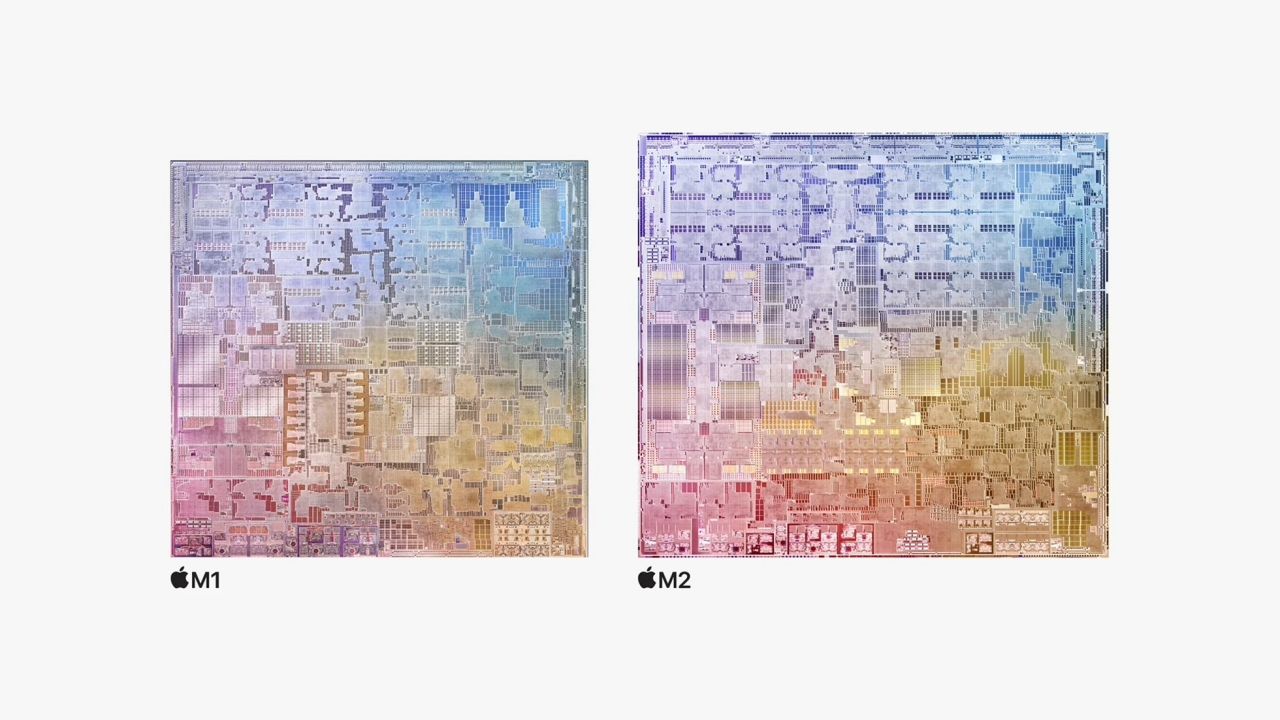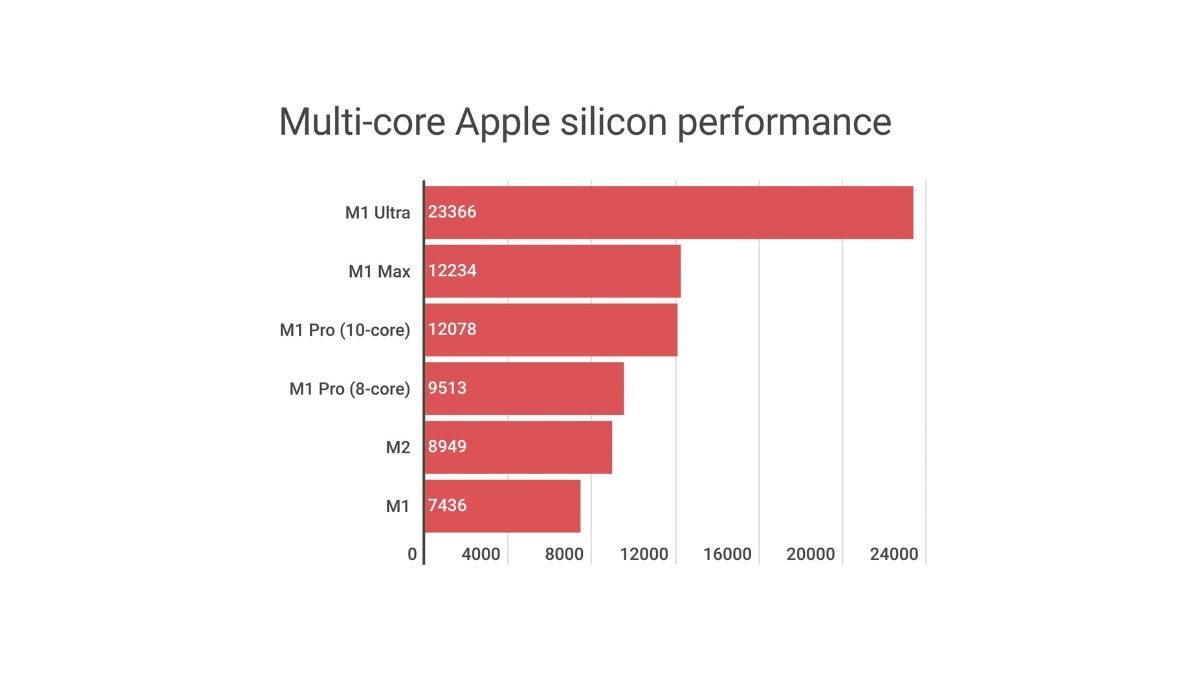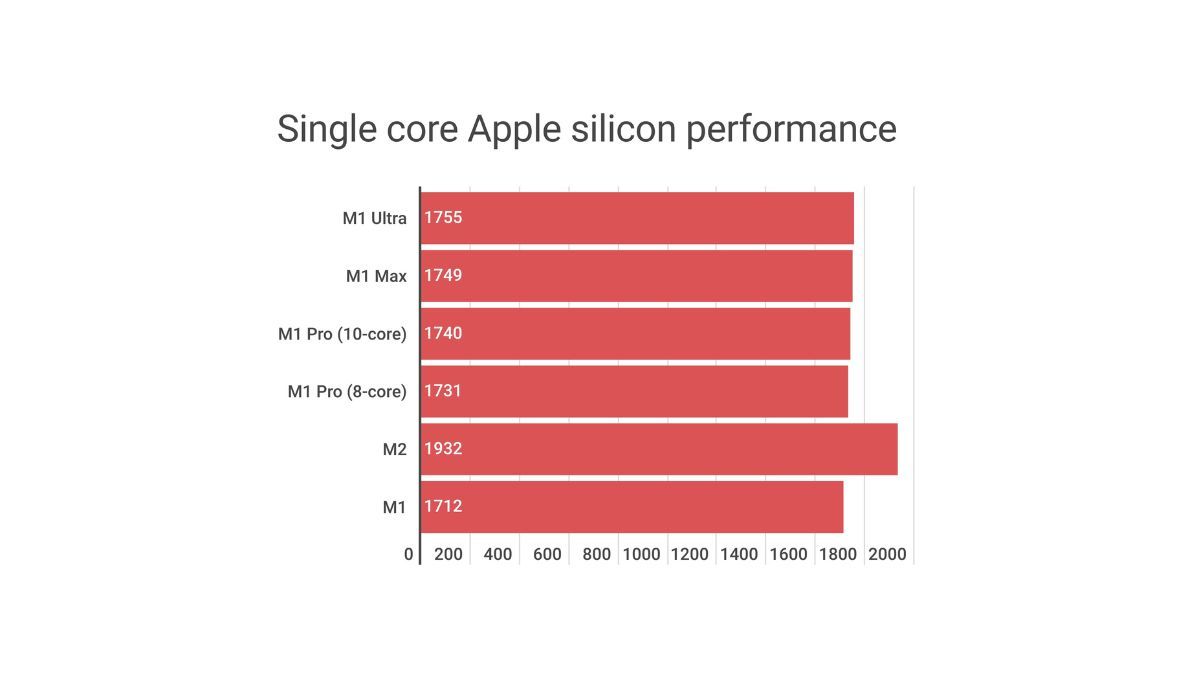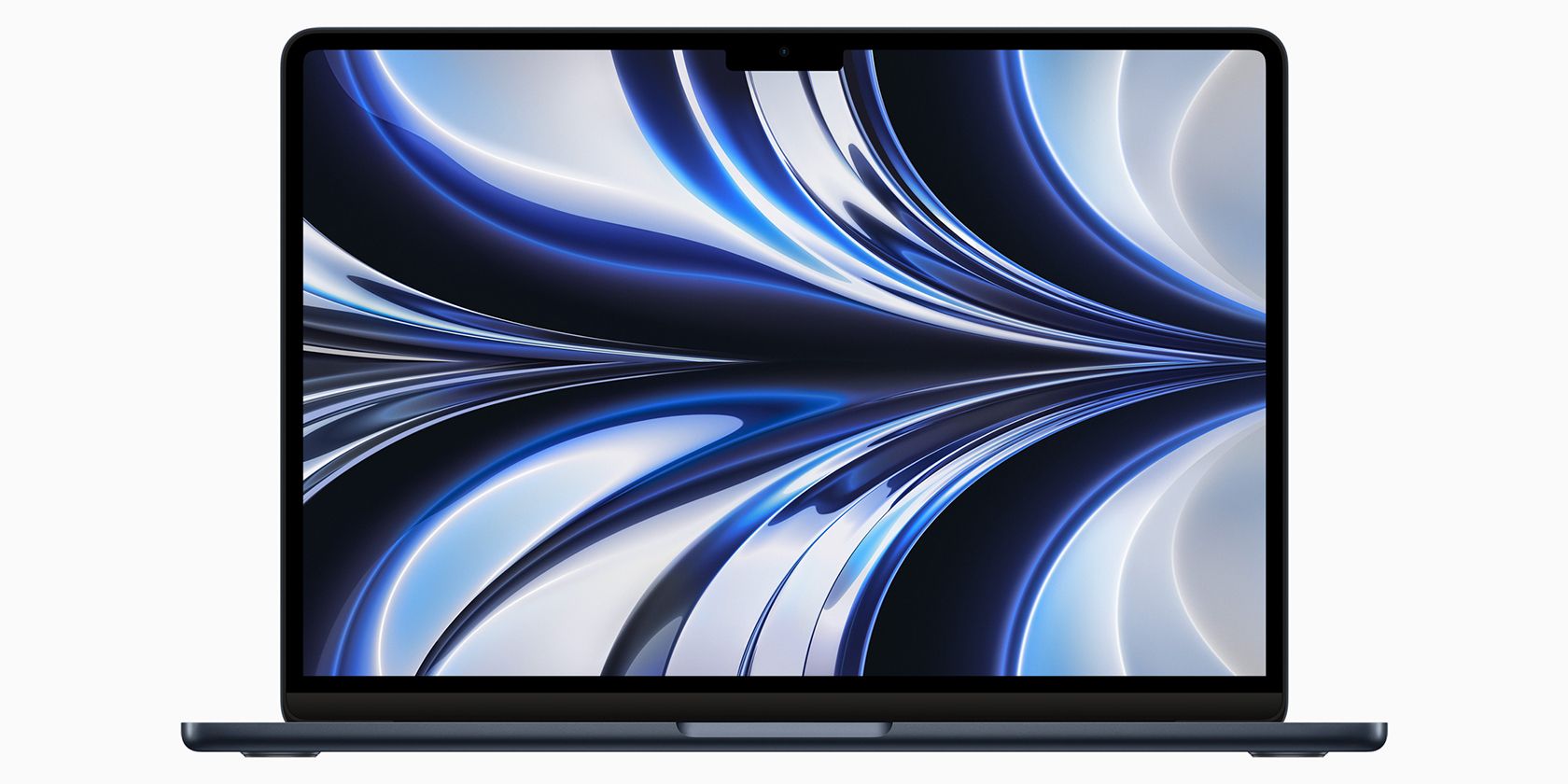Max M2 Vs Max Pro M2
During the WWDC consequence in June 2022, Apple unveiled the M2 chip, ushering in the second generation of Apple silicon chips. Being a second-generation chip, you lot'd wait the M2 to outperform most if non all of its predecessors. However, is that really the case?
Let's compare the M2 chip with the entire M1 range to see if that hypothesis holds any truth. We'll cover everything: the CPU and GPU, memory and bandwidth, performance, and other important details that y'all should consider.
CPU and GPU Cores
All Apple silicon fries apply the visitor's unified memory architecture, which places the CPU, enshroud, neural engine, GPU, security, and more on a single chip, translating to faster communication. At the center of the M2 bit is an eight-cadre CPU with four high-performance cores clocking at 3.49GHz and four power-efficient cores clocking at 2.06GHz.
Efficiency cores are similar to the ones available in the base M1 bit. To stand up out from the M1, the M2 packs 2 additional GPU cores, totaling 10.
The M1 Pro and M1 Max go a mile further than the M2, including a 10-core CPU and up to 16 and 32 GPU cores, respectively. The M1 Ultra, the biggest of all, boasts a 20-cadre CPU with upwards to 64 GPU cores. Nonetheless, the M1 range has lower maximum CPU clock speeds, relative to the M2.
Memory and Bandwidth

The retentivity bandwidth also varies and, equally expected, the M1 Ultra still holds the crown with up to 800GB/s. It'south followed past the M1 Max (upward to 400GB/due south), M1 Pro (up to 200GB/s), M2 (100GB/due south), and finally the M1, with about 68GB/south. On the memory side of things, the M1 Ultra supports up to 128GB of unified memory, followed by the M1 Max with half as much.
The M1 Pro tops out at 32GB, 8GB more than the M2 at 24GB. The M1, on the other mitt, beingness the smaller sibling, only supports up to 16GB of memory. And since Apple tree uses a unified memory compages, you tin't upgrade your retentiveness later on purchasing a device. Therefore, before splurging, we advise that you consider the amount of retentivity you lot'll demand.
Performance
Setting aside all the bells and whistles that tech companies advertise, raw performance is all you should care almost. As long as a scrap'southward performance fulfills your everyday needs, that's all that matters. And this is where things get a little flake complicated. To compare the four chips, nosotros've sourced information from Geekbench 5 tests and averaged it to find the most authentic value for comparison the chips.

First, in multi-core Geekbench 5 tests, the results are just what you'd look. The M1 Ultra, a combination of two M1 Max chips, takes the lead with roughly twice the performance of the M1 Max. The 10-core M1 Pro chip has a massive advantage over the 8-cadre variant, thank you to the ii extra CPU cores.
Unsurprisingly, the M2 blows the M1 out of the h2o with about 20 percent higher multi-core performance. For reference, Apple claimed the M2's CPU is xviii percentage faster, which turns out to be true. However, compared to other chips in the M1 lineup, the M2 notwithstanding doesn't stand up a chance. From our nautical chart, the M2 is a 6 percentage slower than M1 Pro.

Where the M2 does smoothen is in single-core performance. With the M2, Apple uses iv performance cores with a maximum clock speed of 3.49GHz, which, believe it or not, is faster than what you get in the xx-core M1 Ultra. That shows the power of the new high-performance cores in the M2 chip.
Also, the M2 is built using the 2d-generation 5-nanometer engineering that Apple uses in the A15 Bionic chip powering the iPhone 13 series. For the residuum of the M1 serial, the M1 Ultra leads in unmarried-core performance, followed by the M1 Max, M1 Pro, and M1.

One of the key improvements that we saw with the announcement of the M2, relative to the M1, is the new media engine. On the M2, the media engine adds a higher-bandwidth video decoder, enabling support for 8K H.264 and HEVC video. You can as well have multiple streams of both 4K and 8K video with Apple tree's ProRes video engine born.
Both of these are not available in the base M1 chip. However, the M1 Pro and M1 Max have the same powerful media engine, although the latter has upwardly to ii times faster video encoding than the former, due to the bachelor double video encoding engines.
The M1 Ultra has the nearly potent media engine found on any Apple silicon fleck, every bit of writing, with two video decode and iv video encode engines, plus iv ProRes encode and decode engines. So if yous do a lot of editing, yous may have to sacrifice and pay more to get a better media engine than what the M2 provides.
Which Bit Should You Purchase?

First and foremost, all four chips are powerful enough for everyday tasks like browsing, social media use, writing, or fifty-fifty watching YouTube videos. However, your mileage will differ depending on what your "every day" tasks entail. If information technology's resources-intensive activities, similar editing videos, y'all'll undoubtedly do good from the extra multi-core performance of chips like the M1 Pro, Max, or Ultra.
Your upkeep likewise matters, though, and will dictate which fleck you get. Amidst all the options, the M1 is the entry-level 1. You can get an M1 MacBook Air for $999. The M2, on the other hand, will fix you lot dorsum at least $1199 for the M2 MacBook Air. The higher chips in the M1 range cost at least $1999, for the 14-inch M1 Pro MacBook Pro, one of the best MacBooks bachelor.
The college number of GPU cores available in the college chips in the M1 line will be handy for graphic-intensive tasks like gaming. Of course, there's also a question of whether you lot should buy the iMac, Mac Studio, MacBook Air, or MacBook Pro, since that will dictate which chips are available to yous in the first place.
The M2 Succeeds Apple tree's M1 Flake
From the comparisons, it's evident that the M2 bit is a directly successor to the M1. Equally you would wait, it doesn't disappoint in any measure. The M2 majorly improves on what Apple has done with the M1 past delivering extra performance while trying every bit much to maintain or even minimize battery consumption.
The M2 also beats the entire M1 range in unmarried-core operation, largely every bit a outcome of the new loftier-performance cores. However, when considering multi-core performance, it still sites behind the M1 Pro, M1 Max, or M1 Ultra.
Max M2 Vs Max Pro M2,
Source: https://www.makeuseof.com/m2-vs-m1-pro-max-ultra-apple-silicon-chip/
Posted by: nettletonbuilithe.blogspot.com


0 Response to "Max M2 Vs Max Pro M2"
Post a Comment